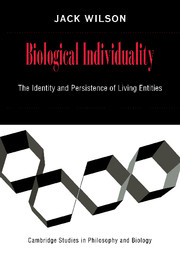Book contents
- Frontmatter
- Contents
- Acknowledgements
- 1 Beyond Horses and Oak Trees
- 2 The Biological and Philosophical Roots of Individuality
- 3 Individuality and Equivocation
- 4 The Necessity of Biological Origin and Substantial Kinds
- 5 Generation and Corruption
- 6 Personal Identity Naturalized
- Appendix: Identity and Sortals
- Notes
- References
- Index
Appendix: Identity and Sortals
Why Relative Identity Is Self-Contradictory
Published online by Cambridge University Press: 05 December 2011
- Frontmatter
- Contents
- Acknowledgements
- 1 Beyond Horses and Oak Trees
- 2 The Biological and Philosophical Roots of Individuality
- 3 Individuality and Equivocation
- 4 The Necessity of Biological Origin and Substantial Kinds
- 5 Generation and Corruption
- 6 Personal Identity Naturalized
- Appendix: Identity and Sortals
- Notes
- References
- Index
Summary
In this appendix, I explore the role of substantial sortals in the relation of identity. The view I present here is an extension of my argument from the sections in Chapters 1 and 2 about substantial kinds. I have relegated this argument to an appendix because many readers may be willing to accept without argument the idea that identity is an absolute relation. It was important to include it though, because of a tendency to interpret my views from Chapter 3 as entailing that the same thing can be correctly identified as more than one kind of substantial individual at a time, even if those kinds have incompatible persistence conditions. Instead, I argue that the right way to think of these different kinds of individuality is to recognize that some of these individuals can overlap through composition without thereby being identical.
If we know that an object a is identical with an object b and that a is an F (where F is a substantial sortal), what role does that substantial kind play in the identity relation? I will consider three positions.
i. Identity is absolute, and neither sortal-dependent nor sortal-relative.
ii. Identity is absolute and sortal-dependent.
iii. Identity is sortal-relative.
In the end, I will argue for (i), that identity is absolute and neither sortal-dependent nor sortal-relative. The substantial sortal picks out the object about which one is making an assertion of identity. This is an important function because of the possibility of more than one thing occupying the same place at the same time.
- Type
- Chapter
- Information
- Biological IndividualityThe Identity and Persistence of Living Entities, pp. 119 - 126Publisher: Cambridge University PressPrint publication year: 1999

